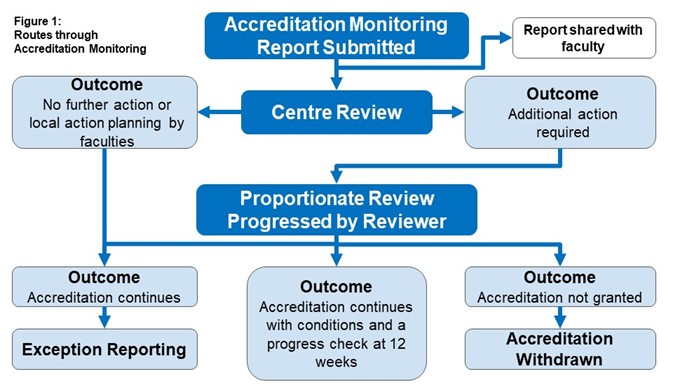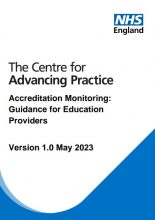Accreditation Monitoring – Version 1.0 May 2023
Contents
- Introduction
- Overview of Accreditation Monitoring
- Completing an Accreditation Monitoring Report
- Accreditation Monitoring Process
- Roles and Responsibilities
- Accreditation Monitoring Report
- Downloads
Introduction
The Centre for Advancing Practice (the Centre) oversees the workforce transformation of advanced level practice, by establishing and monitoring standards for education and training, accrediting advanced level programmes, supporting, recognising educational and training equivalence, growing and embedding the advanced and consultant practice workforce.
The Centre achieves this through its key functions:
- Programme accreditation
- Recognition of education and training equivalence
- Credentials
- Workforce solutions
The Centre’s programme accreditation provides assurance to the wider system of the quality of Advanced Practice Education Programmes by assessing whether those programmes map to the capabilities across the 4 pillars of the multi-professional framework for advanced clinical practice in England (MPF) and Standards for Education and Training (SET).
Accreditation is now continuous, in that there is no specific date for renewal. Instead, programmes accredited by the Centre are subject to monitoring and Exception Reporting, which in turn may lead to re-reviewing programmes.
It’s a given that accredited programmes will change over time to enable evolution and development in line with contemporary practice. The changes may be clinical, regulatory and/or academic. These changes are necessary and welcome. However, to remain accredited a programme must continue to fully map to the MPF and SET.
The Centre works with Education Providers when programme changes arise to make sure those programmes continue to fully map to the MPF and SET. The Centre also engages with Regional Quality Teams and Regional Faculties for Advancing Practice (Faculties), to identify and manage quality concerns raised about programmes at any point in line with the Quality Strategy.
Depending on the quality concerns or changes made to a programme, a proportionate review may need to occur. This may mean a request for additional information or partial remapping, but in more exceptional circumstances, it may mean a full re-mapping to the MPF and SET.
The Centre’s approach to monitoring programmes post-accreditation has two phases: Accreditation Monitoring and Exception Reporting. This guidance explains Accreditation Monitoring.
Programmes that successfully complete Accreditation Monitoring move to Exception Reporting. For more information: the Exception Reporting Guide.
Overview of Accreditation Monitoring
The Centre’s approach to Accreditation Monitoring is:
Responsive
The triggering of a proportionate action can be during the Accreditation Monitoring phase and at any time, in response to an exception report or a quality concern.
Right Touch
The approach is flexible to respond to the nature or impact of programme changes or quality concerns.
Proportionate
Actions taken to address any mapping or quality concerns are proportionate to the level of assurance provided by the Education Provider that they are managing programme changes well and changes do not adversely impact on the programmes quality or continued ability to map against the MPF and/or SET.
Accreditation Monitoring occurs during the initial period of accreditation, usually around the 12-month period of granting accreditation. Satisfactory monitoring moves a programme to Exception Reporting.
Figure 1 below describes an Education Provider’s routes through the Accreditation Monitoring process and the potential outcomes.

Completing an Accreditation Monitoring Report
The Centre will request an Accreditation Monitoring report for each accredited programme usually around the 12-month period of granting accreditation.
The Accreditation Monitoring report asks for an update on:
- Conditions and/or recommendations received as part of initial accreditation.
- Information on any clinical/regulatory and/or academic changes and/or quality updates that apply to the programme over the period.
- Confirmation that the accredited programme continues to fully map to the MPF and SET.
The outcomes of Accreditation Monitoring could be:
No Further Action or Local Action Planning
Where there no changes, or any identified minor quality issues do not impact on the programme’s continued ability to map against the MPF and/or SET, the Centre will take no further action.The programme retains its accreditation and moves to Exception Reporting.
Where any identified minor quality issues that do not impact on mapping against the MPF and/or SET, Faculties may instigate Local Action Planning. The expectation is that the Education Provider engages with their Regional Faculty for Advancing Practice in these circumstances.
As the issues Local Action Planning aims to address do not impact on a programme’s continued mapping against the MPF and/or SET, the programme retains its accreditation and moves to Exception Reporting. Faculties can refer to the Centre and Regional Quality Teams if Local Action Planning proves unsuccessful.
Additional Action Required
Where changes have been made that have the potential to impact on the programmes continued ability to map against the MPF and/or SET, or where a significant quality concern has been identified, a proportionate review will be instigated by the Centre and undertaken by Centre Reviewers. The Education Provider may need:
- To provide additional information
- To undertake partial re-mapping or
- To undertake full re-mapping
In these circumstances, accreditation would continue, pending the outcome of the review.
The outcome of the review could be:
- Accreditation continues and the programme moves to Exception Reporting
- Accreditation continues subject to conditions – A 12-week check is undertaken and if satisfactory, the programme moves to Exception Reporting
- Accreditation is not granted and is withdrawn.
The complaints and appeal policy is available.
Accreditation Monitoring Process
The flowchart provides an overview of the process and timescales for Accreditation Monitoring.
| Stage 1 | Timeline | |
|
Notification | ● The Centre team notifies the Education Provider that an Accreditation Monitoring submission is due using an Accreditation Monitoring Report. ● The Education Provider’s Regional Faculty for Advancing Practice is included in the email to signal that the accreditation monitoring is due by the Education Provider. ● The email will contain a SharePoint link to a form. This link will also allow for any supporting evidence to be uploaded should this be required. |
8 weeks before the accreditation monitoring date |

| Stage 2 | Timeline | |
|
Report Completion |
● The Education Provider updates the report form via SharePoint. ● The Education Provider notifies their Regional Faculty for Advancing Practice that the report has been completed. |
By the deadline outlined in the email |
|
Faculty for Advancing Practice Review |
● The Regional Faculty for Advancing Practice receives the report and following review, completes their section of the report, including any relevant additional information and feedback. ● The Regional Faculty for Advancing Practice team notifies the Centre team of its completion. ● Should the Regional Faculty for Advancing Practice be dissatisfied with the report, the concerns should be discussed with the Education Provider and escalated to the Centre. |
Within 2 weeks |

| Stage 3 | Timeline | |
|
Centre for Advancing Practice Review |
The Centre reviews the submission: ● Where there are no changes or quality concerns, the Centre takes no further action. ● Where minor quality issues have been identified that will not impact on the programme’s continued ability to map against the MPF and/or SET, the Regional Faculty for Advancing Practice may wish to instigate Local Action Planning. In this case, the programme remains accredited and moves to Exception Reporting, enabling Education Providers or Faculties to re-escalate any new or ongoing concerns to the Centre. ● Where changes have been made that have the potential to impact on mapping against the MPF and/or SET, or where a significant quality concern has been identified, a proportionate review will be instigated. ● Centre reviewers will determine the form of the proportionate review, based upon the nature of the change or quality concern. Education Providers may be asked: ● For additional information ● To undertake partial re-mapping or ● To undertake full re-mapping In this circumstance, accreditation continues, pending the outcome of the review. The outcome of the review could be: ● Accreditation continues and the programme moves to Exception Reporting ● Accreditation continues subject to conditions – A 12 week check is undertaken and if satisfactory the programme moves to Exception Reporting ● Accreditation is not granted and is withdrawn |
6-12 weeks (depending on actions required) |

| Stage 4 | Timeline | |
|
Centre Governance |
● All outcomes of Accreditation Monitoring will be reported to and ratified by the Education Assurance Group. Where appropriate, proportionate reviews may also be reviewed by the Independent Panel prior to the Education Assurance Group. |
Next Meeting |
|
Outcome Notification |
● The Centre confirms the outcome of Accreditation Monitoring with the Education Provider. The Regional Faculty for Advancing Practice are also notified of the outcome. |
|
|
Next Steps |
● The Centre records that the continued accreditation is granted/not granted and files within the relevant folder on SharePoint. ● Where continued accreditation is granted, the programme moves to Exception Reporting. |
|
Roles and Responsibilities
The information below provide an overview of the roles and responsibilities for the Centre, Regional Faculties for Advancing Practice and Education Providers in relation to Accreditation Monitoring.
Centre for Advancing Practice
- Maintain and update a central log of accredited programmes
- Maintain oversight of the quality of accredited advanced practice programmes
- Communicate with the Education Provider’s and Regional Faculty for Advancing Practice regarding quality concerns
- Communicate quality concerns into wider quality processes
- Instigate Accreditation Monitoring around the 12 month period of granting accreditation
- Co-ordinate with the reviewers undertaking the proportionate reviews
- Receive and review Accreditation Monitoring reports
- Take proportionate action where substantial changes or quality concerns emerge
- Utilise the Independent Panel where appropriate
- Report outcomes to the Education Assurance Group
- Notify Education Providers of their outcomes
Regional Faculty for Advancing Practice
- Engage with the Education Providers and reiterate their responsibility to engage with Accreditation Monitoring
- Review the Education Providers Accreditation Monitoring report
- Provide input and feedback in relation to Accreditation Monitoring reports, offering key information that links to the triangulation of data and regional intelligence that supports or raises concerns with regards to the accredited programme
- Work with other Faculties where relevant
- Discuss reports with Education Providers where necessary
- Work with Regional Quality teams and the Centre to identify and manage quality concerns
- Notify the Centre of quality concerns escalated to Regional Quality Teams
- Submit an exception report to the Centre where quality concerns emerge
- Instigate Local Action Planning if necessary where minor quality concerns emerge that do not impact on mapping against the MPF and/or SET
Education Provider
- Actively engage with the Centre and Faculties in relation to their accredited programmes
- Submit an Accreditation Monitoring report to the Centre when invited to
- Participate fully in proportionate reviews instigated by the Centre
- Engage with Faculties in their wider monitoring role and to address any minor quality concerns that do not impact on the programmes continued ability to map against the MPF and/or SET
- Communicate changes in programme accreditation status to learners and stakeholders in a timely manner
